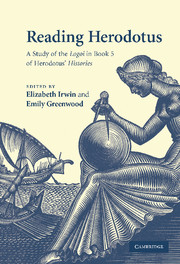Book contents
- Frontmatter
- Contents
- Acknowledgements
- List of contributors
- List of abbreviations
- Introduction: reading Herodotus, reading Book 5
- Chapter 1 ‘What's in a name?’ and exploring the comparable: onomastics, ethnography, and kratos in Thrace, (5.1–2 and 3–10)
- Chapter 2 The Paeonians (5.11–16)
- Chapter 3 Narrating ambiguity: murder and Macedonian allegiance (5.17–22)
- Chapter 4 Bridging the narrative (5.23–7)
- Chapter 5 The trouble with the Ionians: Herodotus and the beginning of the Ionian Revolt (5.28–38.1)
- Chapter 6 The Dorieus episode and the Ionian Revolt (5.42–8)
- Chapter 7 Aristagoras (5.49–55, 97)
- Chapter 8 Structure and significance (5.55–69)
- Chapter 9 Athens and Aegina (5.82–9)
- Chapter 10 ‘Saving’ Greece from the ‘ignominy’ of tyranny? The ‘famous’ and ‘wonderful’ speech of Socles (5.92)
- Chapter 11 Cyprus and Onesilus: an interlude of freedom (5.104, 108–16)
- Chapter 12 ‘The Fourth Dorian Invasion’ and ‘The Ionian Revolt’ (5.76–126)
- Bibliography
- Index locorum
- General index
Chapter 5 - The trouble with the Ionians: Herodotus and the beginning of the Ionian Revolt (5.28–38.1)
Published online by Cambridge University Press: 22 September 2009
- Frontmatter
- Contents
- Acknowledgements
- List of contributors
- List of abbreviations
- Introduction: reading Herodotus, reading Book 5
- Chapter 1 ‘What's in a name?’ and exploring the comparable: onomastics, ethnography, and kratos in Thrace, (5.1–2 and 3–10)
- Chapter 2 The Paeonians (5.11–16)
- Chapter 3 Narrating ambiguity: murder and Macedonian allegiance (5.17–22)
- Chapter 4 Bridging the narrative (5.23–7)
- Chapter 5 The trouble with the Ionians: Herodotus and the beginning of the Ionian Revolt (5.28–38.1)
- Chapter 6 The Dorieus episode and the Ionian Revolt (5.42–8)
- Chapter 7 Aristagoras (5.49–55, 97)
- Chapter 8 Structure and significance (5.55–69)
- Chapter 9 Athens and Aegina (5.82–9)
- Chapter 10 ‘Saving’ Greece from the ‘ignominy’ of tyranny? The ‘famous’ and ‘wonderful’ speech of Socles (5.92)
- Chapter 11 Cyprus and Onesilus: an interlude of freedom (5.104, 108–16)
- Chapter 12 ‘The Fourth Dorian Invasion’ and ‘The Ionian Revolt’ (5.76–126)
- Bibliography
- Index locorum
- General index
Summary
THE LARGER CONTEXT
Placed at the very centre of Herodotus' work (5.28–6.42), the Ionian Revolt of 499–494 bc plays a pivotal role, both chronologically and causally, linking the Persians' Eastern campaigns to their invasions of Greece. It also represents a crucial moment in Herodotus' history of the Ionians, which spans the whole work from beginning to end. The Ionians jump-start the Histories, one might say, and they do so because they find themselves at the receiving end of the first known Eastern aggressions against Greeks (1.5.3, 6.2–3). Croesus of Lydia completes ‘the first subjection of Ionia’, as the narrator summarizes at the end of the Croesus logos. The second is called ‘enslavement’, when Cyrus defeats Croesus and conquers his possessions. And so is the third, which occurs after the failure of the revolt we are examining:
οὕτω δ⋯ τ⋯ τρ⋯τον Ἴωνες κατεδουλώθησαν, πρ⋯τον μ⋯ν ὑπ⋯ Λυδ⋯ν, δ⋯ς δ⋯ ⋯πεξ⋯ς τ⋯τε ὑπ⋯ Περσ⋯ων
In this way the Ionians were enslaved for the third time, [having been conquered] first by the Lydians and twice in a row by the Persians.
(6.32)The Ionians become free from Persian domination after the Greek victory at the time of Xerxes' invasion. But the 1–2–3 count in the statement above proleptically alludes to a fourth subjection, beyond the chronological range of the Histories and not explicitly mentioned in our text. At the time of narration the Ionians are the tributary subjects of Athens.
Herodotus' history of the Ionians is a narrative about being conquered.
- Type
- Chapter
- Information
- Reading HerodotusA Study of the Logoi in Book 5 of Herodotus' Histories, pp. 146 - 167Publisher: Cambridge University PressPrint publication year: 2007
- 29
- Cited by



